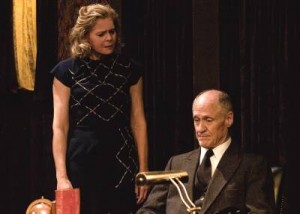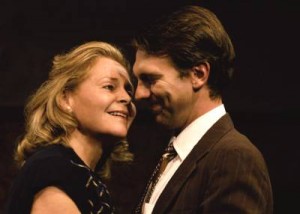
By 2010 standards, not much happens over the course of The Browning Version’s seventy-five minutes, an hour and a quarter which unrolls in real time one evening in the sitting room of an English schoolteacher’s flat.
On the evening in question, departing classics teacher Andrew Crocker-Harris learns whether or not he is to be given the pension he feels he deserves, a heart condition having forced Crocker-Harris, approaching but not yet at retirement age, to resign. He is also told in which position he will deliver an end-of-term speech before the assembled student body. Crocker-Harris’s young replacement and his bride drop by to see the home where they will soon be living, and the rookie teacher tells his predecessor a phrase he has heard used to describe the departing teacher. A teaching colleague arrives for a casual visit, or so it seems until he and Crocker-Harris’s younger wife find themselves alone. A 16-year-old student visits Crocker-Harris for help with his Greek and gives him a copy of the Robert Browning translation of Aeschylus’ Agamemnon. Crocker-Harris’s wife tells her husband what she believes the student’s gift-giving motivation to be. Crocker-Harris’s colleague realizes something about Mrs. Crocker-Harris that he didn’t until this evening. Crocker-Harris phones the headmaster about the position in which he intends to give his end-of-term speech. Crocker-Harris and his wife sit down for dinner.
If this virtually “eventless” hour and fifteen minutes seems not to be the stuff of great theater, think again.
Terrence Rattigan’s The Browning Version packs every bit the emotional wallop now as it did when it was first staged in 1948, and as performed by an all-around stellar cast in Pacific Resident Theater’s pitch-perfect revival, it’s no wonder that The Browning Version made Los Angeles Times Theater Critic Charles MacNulty’s Top Ten list for 2009.
It’s what’s under the outwardly placid, oh-so British surface that makes The Browning Version the powerful piece of theater it is. A marriage between two people who should never have wed, and who have made each other’s lives miserable for the past twenty years. A man facing his failures as a teacher and as a husband. A wife lashing out in the only way she can to give back some of what she feels she has suffered. An adulterous affair used as a weapon. If the Browning Version were set in Italy, shouts and curses would be heard and perhaps even blood would be spilled. Because this is England, the same emotions are kept carefully in check—most of the time—but the end effect is no less powerful.
The entire cast shines under the impeccable direction of Marilyn Fox. Bruce French is so absolutely believable as stodgy, stiff-shirted Crocker-Harris that it comes as a shock to learn that the actor was born in Iowa U.S.A. His performance is layers deep, and Crocker-Harris’s sudden outburst of tears is heart-wrenching proof of this. Sally Smythe resists the temptation to play Millie Crocker-Harris as a villainess, showing us a three-dimensional woman who’s every bit the victim of a bad choice of marriage partner as her husband is. The inspired performances of French and Smythe make this the story of two wounded souls, not just one.
It’s hard to imagine a better choice to play 16-year-old student Taplow than UCLA junior Justin Preston, who not only looks the part but gives Taplow a sweetness, sincerity, and good-natured sense of humor that makes one wish Taplow had even more stage time. Michael Balsley does fine, understated work as the play’s “good guy,” fellow teacher Frank Hunter. Michael Redfield is excellent (as always) as incoming teacher Peter Gilbert, whose slip of the tongue proves so hurtful to Crocker-Harris. William Dennis Hunt once again excels at bringing an intimidating older character to life. Caitlin Beitel does lovely work in her brief scenes as Mrs. Gilbert.
Scenic designer Scott Viman has created an appropriately formal, tidy, well-appointed British sitting room, nicely lit by William Wilday. Sound designer Christopher Moscatiello’s background music sets just the right genteel mood, and Audrey Eisner’s costumes have just the right mid-twentieth century look.
For a play written over sixty years ago, The Browning Version seems not a tad dated, especially in a production as perfectly staged as this one. In the gifted hands of its cast and director, Terrence Rattigan’s subtly acidic take on Goodbye Mr. Chips is contemporary-classic theater at its finest.
Pacific Resident Theatre, 703 Venice Boulevard, Venice. Through February 14.
www.PacificResidentTheatre.com
–Steven Stanley
January 9. 2010
Photos: Vitor Martins




 Since 2007, Steven Stanley's StageSceneLA.com has spotlighted the best in Southern California theater via reviews, interviews, and its annual StageSceneLA Scenies.
Since 2007, Steven Stanley's StageSceneLA.com has spotlighted the best in Southern California theater via reviews, interviews, and its annual StageSceneLA Scenies.







 COPYRIGHT 2024 STEVEN STANLEY :: DESIGN BY
COPYRIGHT 2024 STEVEN STANLEY :: DESIGN BY